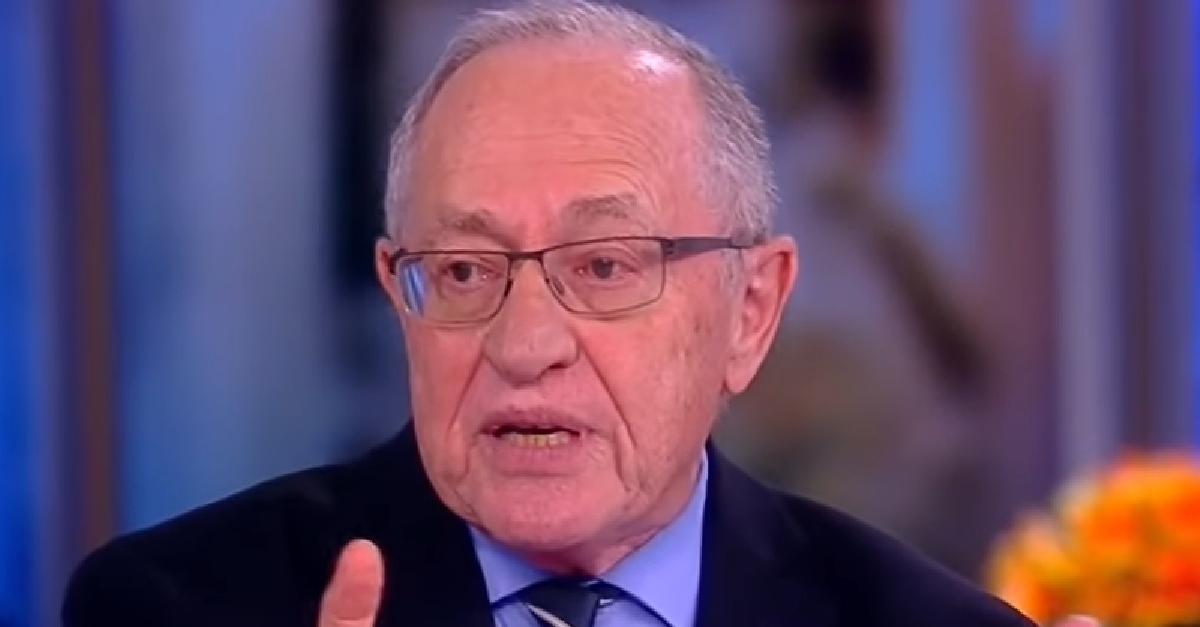
Someone really doesn’t want celebrity attorney Alan Dershowitz to access the long-sought-after tranche of secret Jeffrey Epstein files. But we don’t know who it is.
An unknown person represented by counsel filed a letter motion with the Southern District of New York (SDNY) on Monday arguing that Dershowitz should not be allowed to bypass the system for release of the Epstein files. That system is the result of a years-long legal battle hashed out between attorneys for Epstein survivor Virginia Roberts Giuffre and Epstein’s alleged groomer Ghislaine Maxwell.
John Doe alleges in the filing:
By [a recently submitted court] letter, Dershowitz sets forth his intent to seek an order compelling Plaintiff Giuffre “and others” to produce “all filings and discovery materials, including third-party discovery,” from Maxwell, including documents governed by the Maxwell Protective Order and sealed materials presently under review by this Court pursuant to the agreed-upon protocol.
“This marks Dershowitz’s second – or, by some measures, third – attempt to make an end- run around this Court’s carefully constructed unsealing protocol,” the motion continues. “Just as the Court denied Dershowitz’s prior attempts, it should deny this one.”
In early June, Dershowitz filed a letter motion of his own that attempted to modify the protective order that has governed the long process of sealing, unsealing and releasing the Epstein files since 2016–following a defamation lawsuit filed against Maxwell by Giuffre after the former publicly disputed the latter’s claims of sexual abuse.
Dershowitz, in turn, sued Giuffre for defamation over allegations that the Harvard Law School professor emeritus sexually assaulted her on multiple occasions as part of Epstein’s global elite pedophile sex trafficking operation. The second lawsuit relies substantially on the first; Dershowitz says the full collection of documents will support his persistently-maintained claims of innocence. Dershowitz has said that he never even met Giuffre.
Dershowitz’s June 12 motion also asked for the court to sign off on the release of various additional discovery documents in Giuffre’s possession and in the possession of unnamed third parties–presumably including some relevant discovery materials currently possessed by the non-party John Doe who filed the Monday motion.
John Doe casts Dershowitz’s efforts as both an affront to the “privacy and reputational rights” of the non-parties implicated in the documents–and as an effort to create a new, long and drawn-out legal process that would ultimately stall the release of the Epstein files.
“[T]he wholesale importation of thousands of documents from Maxwell to Dershowitz – and the concomitant unsealing challenges they carry with them – would not foster judicial economy or efficient discovery,” Doe’s attorneys Nicholas Lewin and Paul Krieger argue. “Indeed, Dershowitz’s approach would have the opposite effect: it would unnecessarily replicate, en masse, the unsealing challenges the Court, parties and non-parties face in this case.”
Moreover, Doe seems to suggest that Dershowitz wants to blow up the protective order for some sort of a not-allowed and nefarious purpose but doesn’t exactly specify what that might be.
Again, the letter motion [emphasis in original]:
One key provision of the Maxwell Protective Order – the substance of which courts have found dispositive in denying modification – is found in Section 4, which provides that information designated as “confidential . . . shall not be disclosed or used for any purpose except the preparation and trial of this case” (emphasis added). Dershowitz’s instant application seeks to use these materials for an entirely different purpose in an entirely different case and thus runs directly against this provision.
The mystery filer also claims there’s already reason enough to suspect the controversial attorney based on allegations of impropriety in his own defamation lawsuit.
“Dershowitz apparently has already evinced an unwillingness to comply with the terms of protective orders,” the motion alleges. “Although we do not have access to the Sealed Documents and the confidential discovery materials, Giuffre’s filing notes that Dershowitz has improperly referenced the contents of sealed materials in his public filings. Dershowitz denies the contention, but then declares that he should not be obligated to file his contemplated motion under seal – again indicating his practice and intent to wage his ongoing dispute with Giuffre in the press. Non-parties should not become casualties in this battle.”
Read the full letter motion below:
John Doe v Dershowitz by Law&Crime on Scribd
[image via screengrab/The View]